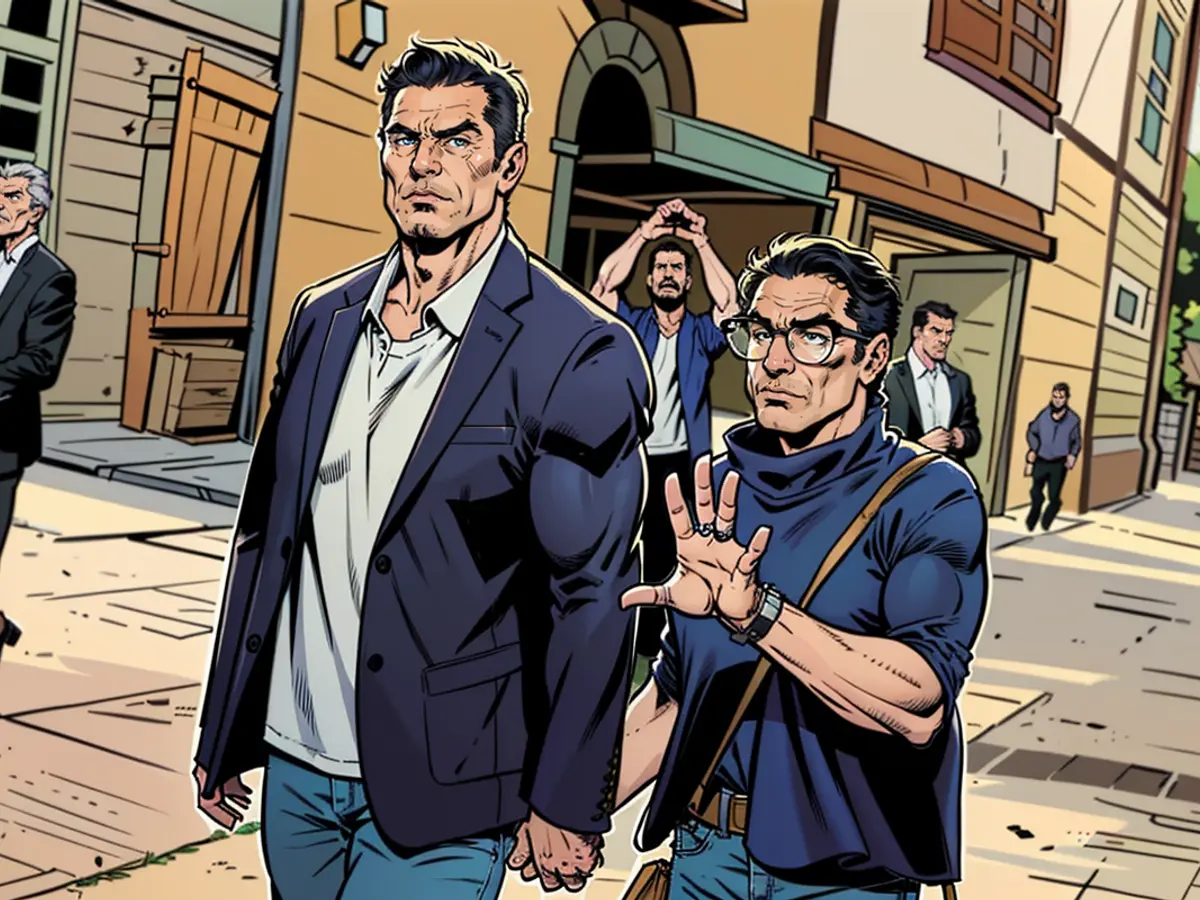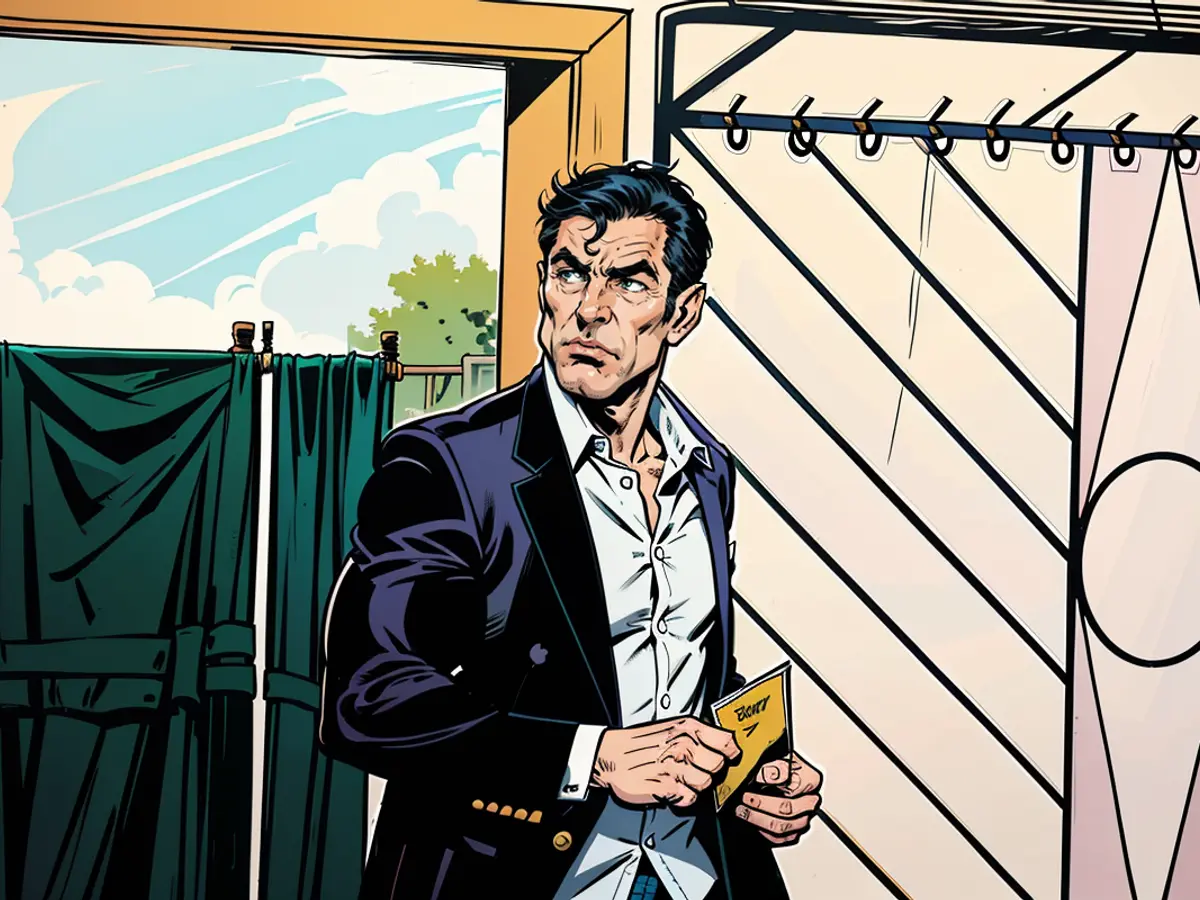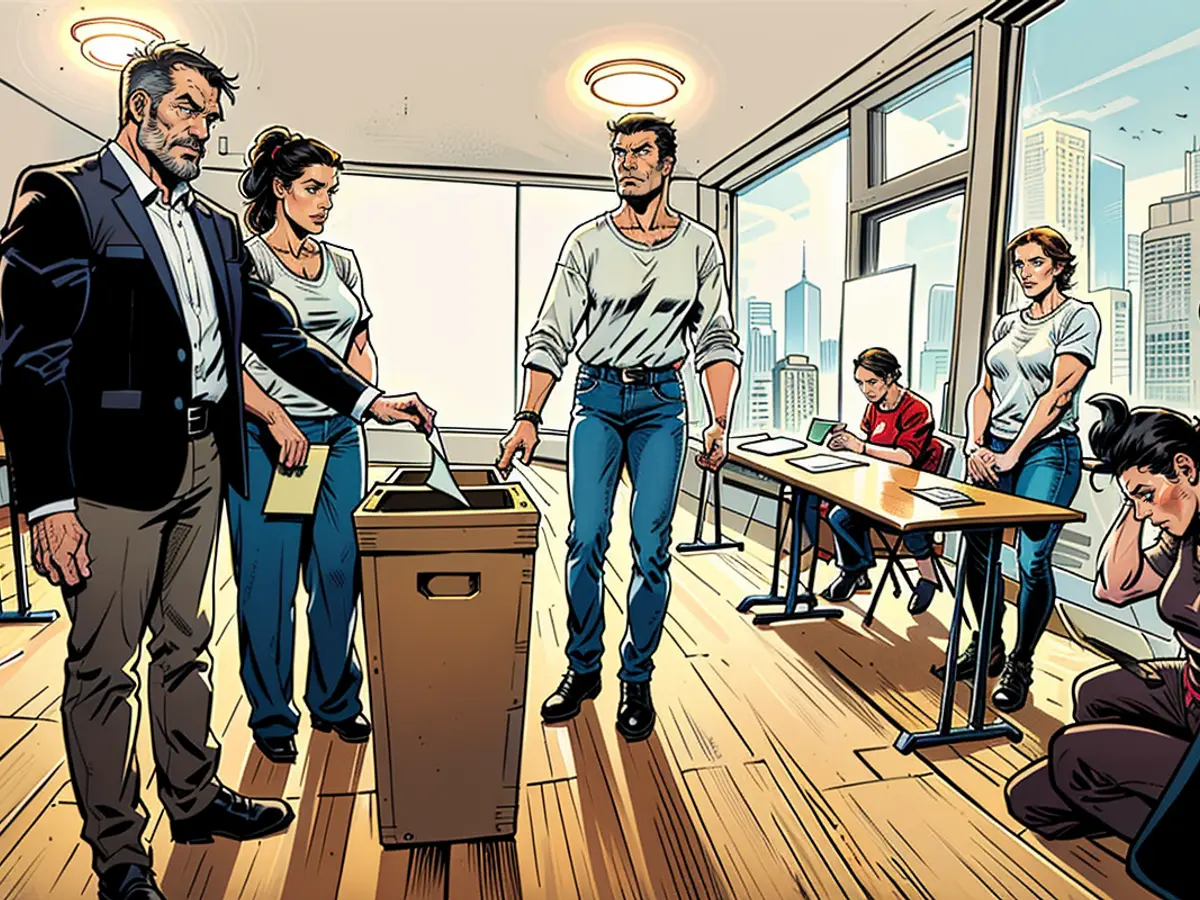The Authority has been tasked with drafting a proposition for a mandate aimed at safeguarding laborers from hazards stemming from radiation exposure, of an ionizing nature.
22:07 Thuringia: A Significant Number of Young Voters Support AfDApproximately one-third of young voters in Thuringia have chosen to support the AfD, a party categorized as far-right by the domestic intelligence agency, according to a survey conducted by infratest-dimap for ARD. Among 18- to 24-year-olds in Thuringia, 38 percent voted for the AfD, while The Left secured 16 percent and the CDU received 13 percent. The Greens saw the lowest support among young voters, with only 6 percent of the votes.
21:39 Kretschmer Secures Direct Win in SaxonySaxony's Minister President Michael Kretschmer has emerged victorious in the direct election in his constituency of Görlitz II, garnering 47.2 percent of the votes. The AfD candidate came in second with 39.4 percent, while in Kretschmer's constituency, the CDU performed poorly, earning only 34.2 percent compared to the 37.3 percent voted for the AfD.
21:32 Early Predictions for Saxony: CDU Has the EdgeBased on early projections for Saxony by both ARD and ZDF, the CDU appears to be leading the AfD by a small margin. Infratest Dimap (ARD) and the Forschungsgruppe Wahlen (ZDF) both show the CDU leading with around 1 percentage point, with 31.5 to 31.8 percent, compared to the AfD's 30.4 to 30.8 percent. Initially, the Forschungsgruppe Wahlen had anticipated a close race between the CDU and AfD, but the ARD projection consistently showed the CDU in the lead.
21:21 Thuringia: Ramelow's "Wish" Likely UnfulfilledThe Left has experienced significant losses in Thuringia's state elections, and incumbent Minister President Bodo Ramelow may be forced to step down. One of Ramelow's hopes for the evening—that the AfD would not receive a third of all votes—is unlikely to come true, as indications suggest that the AfD has managed to achieve this milestone, potentially hindering decisions requiring a two-thirds majority.
21:13 SPD Remains Loyal to Scholz Despite Poor ResultsFederal Chancellor Olaf Scholz continues to have the backing of his party, the SPD, despite the underwhelming performances in Thuringia and Saxony's state elections, according to SPD chairman Lars Klingbeil. In an interview with ZDF, Klingbeil said, "And as the federal chairman of the party, I expect everyone to now work even harder than they have been." Each party member must now strive to win back voters, Klingbeil emphasized. "Everyone must now do their part to improve the situation."
21:02 FDP Deputy Chairman: "Traffic Light coalition has lost its legitimacy"FDP deputy chairman Wolfgang Kubicki has called for consequences following the poor results of the traffic light parties in Saxony and Thuringia's elections. "The election results demonstrate: The traffic light coalition has lost its legitimacy," Kubicki wrote on "X." If a significant portion of the electorate rejects it in such a manner, it should carry consequences. People seem to believe that "this coalition is damaging the country." The FDP failed to surpass the 5 percent threshold in both state elections and is currently polling at just 1 percent.
20:41 Thuringia: Höcke Falls Short of Direct MandateThe district of Greiz II, where AfD faction leader Björn Höcke is running, has been counted: Höcke has not received a majority of votes to automatically enter the Thuringian state parliament. According to ntv information, the party will secure Höcke's seat in the state parliament. Another AfD MP will relinquish their mandate in favor of Höcke.

20:37 Saxony: Left Party Likely to Make it into Parliament Despite 4% SetbackDespite its notable losses, the Left party appears likely to secure a seat in the Saxony state parliament despite not meeting the 5% threshold with second votes and currently projected at 4.3% in ZDF's current estimation. Two Left direct candidates in Leipzig constituencies hold comfortable leads over the competition, potentially securing two direct mandates for the Left party. Two direct mandates would be sufficient to guarantee the Left party at least a few seats in the new state parliament. The two potential constituency winners could also secure top positions on their party's state list, causing the current coalition of CDU, SPD, and Greens to lack a majority. Minister President Kretschmer would need the BSW for a governing majority.
20:17 Prediction for Saxony: CDU Edge Over AfD minimalAccording to the recent ZDF forecast, the CDU in Saxony only has a marginal edge of 0.1 percentage points over the AfD. According to this, the Christians Democrats are at 31.5 percent, the AfD, labeled as right-wing extremist by the constitutional protection agency, at 31.4. In Thuringia, the AfD seems to have surpassed the CDU in projection. The Greens are currently at 5.1 percent in Saxony and could potentially lose their parliamentary seats. The Left has slim chances with a projected 4.3 percent. The SPD is assured of a spot in the state parliament with 7.6 percent.
19:56 Thuringia: Höcke's Direct Seat in DoubtAfD faction leader Björn Höcke's direct entry into the state parliament is now questionable. With 68 of 74 electoral districts counted, CDU candidate Christian Tischner is leading with 42.3% of the votes, ahead of Höcke, who has 40.4%. If Tischner wins a majority of votes in the Greiz II district, Höcke will not secure a direct seat and will rely on a parliamentarian position through the state list, which he leads. However, if several AfD candidates are successful in the direct elections, no one will enter parliament via the state list.
19:50 Höcke on AfD Victory: "The Wall Policy has Failed"In Thuringia, the AfD is the most influential force entering the state parliament. "The wall policy has failed," said Höcke, the party's leading candidate, in an interview with ntv. He described the election result as "historic" and discussed the upcoming government formation.
19:42 Ramelow on Left Party Decline: "CDU Constantly Equated Us with AfD"Thuringian Minister President Bodo Ramelow views two reasons for the "cannibalization" of his Left Party: "First and foremost, a CDU that constantly equated the AfD and the Left, constantly pointing the 'exclusionist' finger at us, even though they factually shared power with us for five years," Ramelow said on ntv. He also cited the BSW's announcement that it would secure 17% of the votes for the AfD as another reason for the Left's decline. Ramelow could still celebrate the high voter turnout.
19:26 Nouripour on AfD Success: "Thoughts with Those Who are Afraid"The AfD is securing over 30% in both Saxony and Thuringia, leaving the coalition parties far behind. Green Party leader Omid Nouripour sees the AfD's election result as a "turning point" and a call to defend democracy together.

19:13 Latest Projection for Saxony: CDU Advantage NarrowsThe most recent ZDF projection shows the AfD closing in on the CDU: The Christian Democrats now have a slim lead with 31.7%, barely ahead of the AfD with 31.4% of the votes cast. The BSW comes in at 11.4%, the SPD at 7.8%. The Greens could feel more secure in the state parliament with 5.5%, while the Left would fail to meet the 5% threshold with 4.3%.
19:08 Wagenknecht Wants Coalition with CDU and Possibly SPD in ThuringiaBSW leader Sahra Wagenknecht is aiming for a coalition with the CDU and possibly the SPD in Thuringia. "We greatly hope that we will be able to form a good government together with the CDU - possibly also with the SPD," Wagenknecht said in the ARD. After five years of minority government, people want a stable majority government that addresses concrete problems like "massive teaching shortages" in Thuringia. At the same time, they want a state government that "raises its voice" in federal politics - one that stands for peace, diplomacy, and against the stationing of US missiles in Germany. Wagenknecht ruled out a coalition with the AfD for Thuringia.
19:02 Preliminary Result for Thuringia: AfD Further Strengthens its PositionA ZDF preliminary result for the election outcome in Thuringia shows the AfD even more powerful than initial projections. According to this, the far-right party is expected to receive 33.1 percent of the votes in the state. The CDU is at 24.3, Sahra Wagenknecht's alliance manages 15 percent from scratch. The Left, currently governing with Bodo Ramelow as the popular Minister-President, loses nearly 8 percentage points and is at 11.7. The SPD gets 6.6, and the Greens 4 percent of the votes.
18:56 Goering-Eckardt on AfD's Success: "Failure of German Democracy"Leaders of the Green party are more alarmed by the AfD's success in Thuringia than by their own electoral defeat. Katrin Goering-Eckardt, the Green party's co-chair, views the far-right party's success as a "failure of German democracy." Party leader Omid Nouripour feels his party's pain is "minimal" when considering that the AfD has become the strongest force in a state parliament.
18:48 Kretschmer in Saxony: "We've Got Plenty to Smile About"The current Minister-President of Saxony, Michael Kretschmer, views the CDU as the foundation of the governing coalition. "We've got plenty to smile about," he shared at the CDU's election event. "The past five years have been challenging, but Saxony trusted us, and they didn't opt for a protest vote. We're well aware of the disappointment people feel towards Berlin."
18:39 Preliminary Result for Saxony: CDU's Lead over AfD DecreasesPreliminary analyses by ZDF suggest that the CDU's advantage over the AfD in the Saxony state election has shrunk: The CDU holds a slim lead at 31.9%, while the AfD is close behind with 31.3%. BSW is at 11.6%, the SPD at 7.8%, and the Greens could potentially enter the state parliament with 5.2% of the votes. Conversely, the Left lags behind with 4.5%.

18:33 Weidel Pushes for AfD Involvement in Government in Thuringia and SaxonyAfD's party leader Alice Weidel insists on participating in the Thuringia and Saxony governments. "In typical German fashion, the strongest party, which is the AfD, traditionally initiates exploratory talks," Weidel explained in ARD, referring to Thuringia. "The voters want the AfD to be part of the government. In both states, we catch 30% of the voters, and a stable government is impossible without us."
18:30 Kuhnert Acknowledges SPD's Modest Results in Thuringia and SaxonySPD secretary-general Kevin Kuhnert acknowledged the lackluster results in the Thuringia and Saxony elections. "This is certainly not something to celebrate for the SPD," he admitted in ARD. Despite its struggles, the party avoided leaving the state parliaments. "There was a genuine risk of falling off the map," he stated. "Persevere, because we're needed." A sea change is required, he suggested, emphasizing the importance of communicating better with voters and heeding their concerns.
18:23 Höcke Praises Thuringia Result as "Major Triumph"The AfD parliamentary group leader Björn Höcke hails the Thuringia result as a "major triumph." The AfD has risen to become the leading party in the federal state. "The nonsense about firewalls needs to come to an end," Höcke added on MDR. He maintained that progress is contingent on the AfD.
18:21 Chrupalla Celebrates Thuringia as "Sensational Result"Chrupalla, AFd party chair, proclaims the result in Thuringia an "extraordinary achievement" that mirrors the evolving public sentiment in both states. The AfD is willing to negotiate with all parties. "In Saxony, we're close to being equal to the CDU," Chrupalla explained on ZDF. He stressed that the AfD aims to govern for the betterment of Saxony.
18:17 Linnemann Rules Out Coalition with AfD in Thuringia or SaxonyLinnemann, CDU secretary-general, forbids any form of collaboration with the AfD in Thuringia and Saxony. "This is something we're very firm on," he asserted on ARD. The CDU will now establish governments from the parliamentary center and is optimistic about its chances. The CDU remains the last bastion of the people's parties, while the traffic light parties have suffered setbacks, he claimed.
18:13 Saxony Projection: CDU Leads with AfD in Second Place, BSW at 12%, Greens Edging OutThe initial projection for the Saxony state election indicates the CDU as the winner with 31.5% of the vote, ahead of the AfD with 30%. The BSW is the third-strongest force with 12%, while the SPD remains in the state parliament with 8.5%. The Greens border on entry to the state parliament with 5.5%. The Left fails to make the cut with 4%, and the FDP fails to secure a seat in the new parliament.

18:10 Thuringia Projection: AfD Ahead of CDU, BSW Gets 16%The initial projection for the Thuringia state election suggests an edge for the AfD with 30.5% of the vote, followed closely by the CDU with 24.5%. The Left captures 12.5%, the SPD qualifies for a seat in the state parliament with 7%, and the BSW secures its entry with 16%. The Greens and the FDP fall short of the 5% threshold.
17:18 Höcke's Future in State Parliament UncertainThe party leader of the AfD in Thuringia, Björn Höcke, might not secure a seat in the upcoming state parliament. Interestingly, his successful party comrades could potentially pose a threat to him. Many of the AfD members running in constituencies have high chances of obtaining direct mandates. Contrarily, Höcke is facing tough competition from the CDU candidate, Christian Tischner, in his constituency of Greiz II. If Tischner manages to win and the AfD secures more direct mandates than entitled, no one can enter via the state list, not even Höcke, despite holding the top spot. In such a scenario, the AfD might persuade a successful direct candidate to relinquish their state parliament seat, enabling Höcke to secure his mandate.
16:48 AfD Thuringia Shuns Media CoverageIt's likely that the Thuringia AfD's election party will receive no media coverage. The party, classified as right-wing extremist by the constitutional protection agency, attempted to exclude specific media outlets from the event. However, the court prohibited this, hence the state party excluded the entire press due to alleged organizational issues.
16:29 Significant Percentage of Votes Cast by Mail in SaxonyFor the state election dubbed "critical" by Saxony's CDU Minister President Michael Kretschmer, approximately a quarter of eligible voters have already submitted their votes by mail. The state election supervisor anticipates 24.6% of voters to have voted by mail. The in-person voter turnout so far only barely surpasses that of 2019.
15:52 Höcke and Ramelow Cast Their VotesThuringia's AfD leader and top candidate, Björn Höcke, and Minister President Bodo Ramelow of the SPD cast their votes at noon. Höcke arrived in a Lada Niva, a Russian-made off-road vehicle, in Bornhagen, Eichsfeld district, while Ramelow voted with his wife in Erfurt's state capital.
15:40 Voter Turnout Higher Than Previous ElectionsIn Thuringia, by 2:00 PM, 44.4% of voters had cast their ballots, surpassing the turnout of the previous election five years ago by over two points. Mail-in voters have not been accounted for in these statistics, but a high turnout is indicated. In Saxony, the turnout was also higher than in 2019, but only slightly. However, the election supervisor expects significantly more mail-in voters than in 2019. Polling stations in both states will close at 6:00 PM.

15:13 Kretschmer Hopes for Traffic-Light Parties in State Parliament
14:40 Top Issues for Saxony and Thuringia VotersApproximately a third of people in Saxony and Thuringia plan to vote for the AfD in the September 1st elections. A large survey sheds light on the reasons. It highlights the main concerns and problems, including migration.
14:13 Höcke Leaves Polling Station RapidlyAt the Thuringia state election, AfD's top candidate, Björn Höcke, voted at midday. He left the Bornhagen polling station promptly and did not speak to journalists on site. Having consistently lost to CDU candidates in his Eichsfeld home constituency, Höcke switched to Greiz. Regrettably, he also faces defeat there against the CDU.
13:50 Voter Turnout in Thuringia Mirrors 2019 LevelsIn Thuringia, the voting turnout appears to be resembling the previous parliamentary election levels. According to the state election commissioner, 32% of eligible voters had cast their ballots by 12 pm. Mail-in voters are not included in these figures. In 2019, the voting turnout was 31.2% at this time. There appears to be increased interest in the state election compared to the European and local elections held earlier this year. In June, the voting turnout was 24.3% at the same time.
13:29 Anticipated High Voter Turnout in SaxonyIn Saxony, a high voter turnout is expected for the state election. By midday, 25.8% of eligible voters had cast their ballots, according to the Statistical State Office in Kamenz. In the 2019 state election, the figure was 26.2% at the same time. Mail-in voters are yet to be accounted for in the preliminary figures. It is projected that 24.6% of eligible voters will cast their votes by mail, an increase from 16.9% in 2019. The elections have proceeded without any disruptions so far.
13:11 von Lucke: Possible Election Result Could Weaken Berlin CoalitionThe results of the state elections in Saxony and Thuringia are yet to be determined. If the SPD fails to secure a seat in the state parliament, political scientist Albrecht von Lucke suggests that it would almost constitute an earthquake. He discusses the election and its potential consequences in an interview.

12:44 Police investigating threat at polling station in GeraPolice officers in Gera are currently investigating a threat made at a polling station. A gentleman, sporting an AfD party T-shirt, showed up to cast his vote in the morning, reported a police spokesperson. The polling station manager requested the man to take off the shirt as party promotions were prohibited within the polling station. He obeyed, but became agitated upon leaving the polling station grounds, warning he'd return due to the incident. Police obtained a statement from him and cautioned him appropriately. Meanwhile, police in Erfurt are investigating instances of political graffiti ("Höcke is a Nazi") found near polling stations as incidents of vandalism.
12:15 Correctiv alerts of circulating false infoCorrectiv, a research network, is warning against a recurring fake claim claiming that signing the ballot paper protects against vote tampering. Contrary to this belief, according to the Federal Returning Officer's office's confirmation to Correctiv, "Entry of a signature on the ballot paper by the voter compromises the ballot's secrecy and renders the entire ballot paper invalid."
11:51 Voigt eyes "stable majority relations" in ThuringiaThuringia's top CDU candidate Mario Voigt has already cast his vote. He expressed his hope that many Thuringians would turn out to vote and exercise their right to shape the land's future. Furthermore, Voigt aspired for the restoration of "stable majority relations" to facilitate the land's advancement.
11:25 Sonneberg experiences escalation in right-wing extremist attacksGermany's first district under an AfD politician, Sonneberg, has faced an alarming increase in right-wing extremist attacks. Activists have felt heavily threatened and have, consequently, ceased their operations. Reportedly, the number of such attacks has skyrocketed fivefold in a year, drawing attention to the potential connection with the district administrator.
10:57 Kretschmer reflects on "most significant election in 34 years"Saxony's Minister President Michael Kretschmer referred to the state election as "arguably the most important election in 34 years." At the polling station in Dresden, he expressed gratitude towards those who chose differently in previous elections but have now decided in favor of the Saxony Union, the "strong force in the bourgeois center."
10:30 Ramelow dismisses Wagenknecht's candidacyFor the Minister President of Thuringia, Bodo Ramelow, election day represented "a festival of democracy" - even in the potential absence of his re-election. In an interview with ntv, he explained his stance on minority governments and the doubts he harbored regarding the competence of the BSW.

09:59 Historian raises concerns about election date and AfDHistorian Peter Oliver Loew criticized the choice of September 1 for the state elections in Saxony and Thuringia, citing an absence of appropriate historical sensitivity. He expressed concern about a potential victory by the AfD, which is classified as "securely right-wing extremist" by the domestic intelligence service in both states, posing the risk of "unfortunate associations."
09:30 "Crucial election": All data on the Saxony state electionOver 3.3 million electors in Saxony have the opportunity today to determine Saxony's political trajectory by choosing who should lead the state parliament in the upcoming years. If the CDU loses its leading position in the state, which it has maintained since 1990, Minister President Michael Kretschmer described the election as "crucial."
09:05 Kretschmer accuses Ampel of "haste" before the electionElection day in Saxony, and scrutiny remains whether Michael Kretschmer will extend the CDU's winning streak in the state. In an ntv interview, he commented on topics such as the refugee debate, the traffic light coalition, and the Ukraine war.
08:24 Concerns regarding AfD's impact on democracyPolls indicate that the AfD is poised for a substantial increase in power in the upcoming elections in Saxony and Thuringia. This development poses a potential threat to democratic institutions, as highlighted by a research group. According to them, despite the belief in robust rule of law, this isn't truly the case.
08:00 Polling stations commence operations in Thuringia and SaxonyElections for new state parliaments have officially commenced in Thuringia and Saxony today. According to polls, the AfD is likely to experience significant growth in Thuringia. In Saxony, the CDU of incumbent Minister President Michael Kretschmer and the AfD are locked in a tight race. Preliminary results should be available by 6 PM, offering insight on the mood of the populace in both states. These elections also serve as a barometer for the traffic light coalition in Berlin.
In the present scenario, the red-red-green coalition led by Minister President Bodo Ramelow (Left), governing in Thuringia, is struggling to maintain a majority in the polls. An alternative government setup post-election could comprise of the CDU, the Sahra Wagenknecht Alliance (BSW), and the SPD. The situation in Saxony is ambiguous regarding whether the existing coalition of CDU, SPD, and Greens continues to hold a majority. Kretschmer does not dismiss the idea of an alliance with the BSW. The Left party in Saxony faces the risk of being ousted from the parliament. There's a similar plight looming over the Greens and FDP in Thuringia.

In the Thuringia state elections, the Alliance for Germany (BSW) led by Sahra Wagenknecht has expressed interest in forming a coalition with the CDU and potentially the SPD. (from 19:08)
In Saxony, the Alternative for Germany (AfD) is pushing for involvement in the government, claiming that they are the strongest party with over 30% of the votes. (from 18:33)








